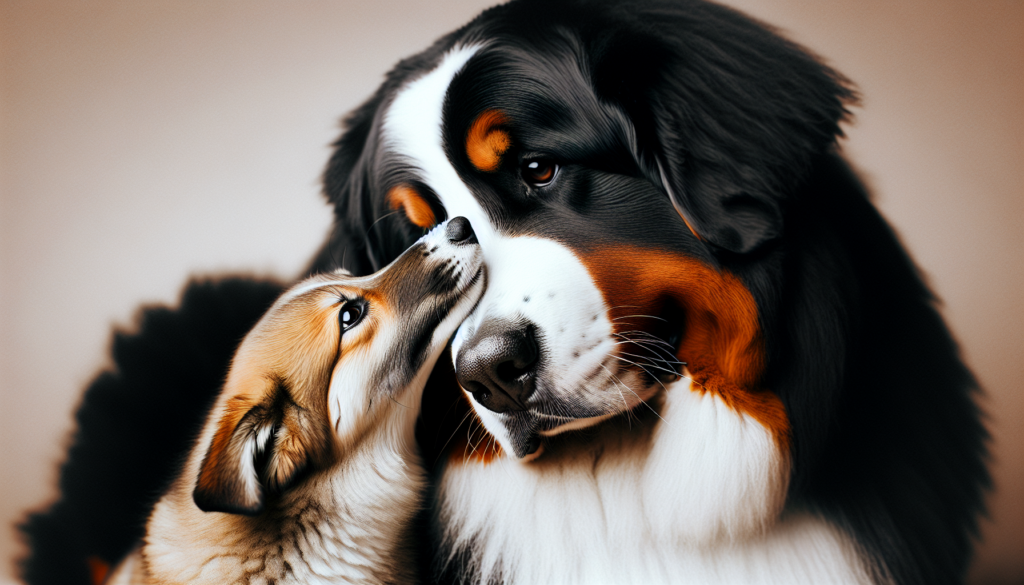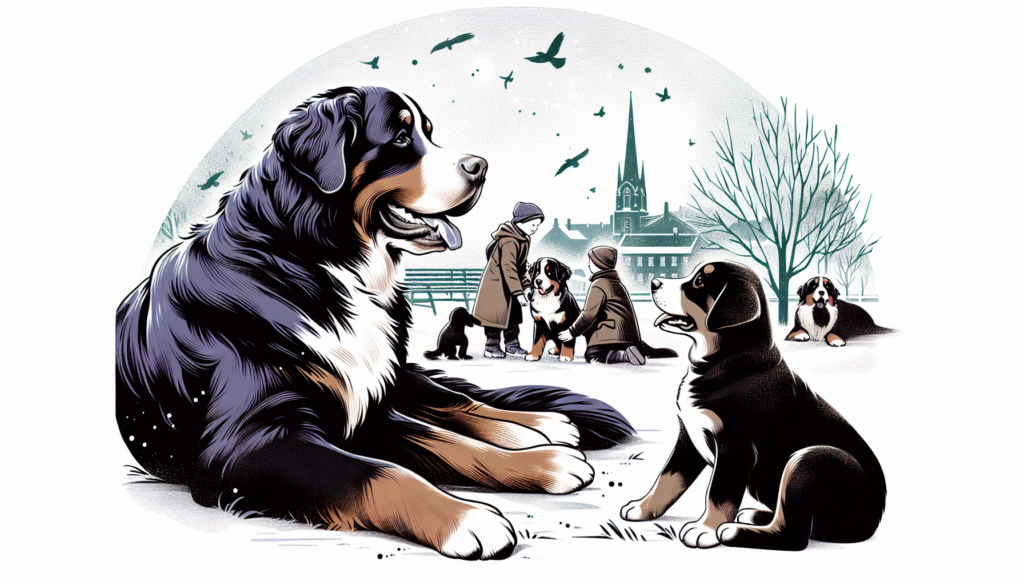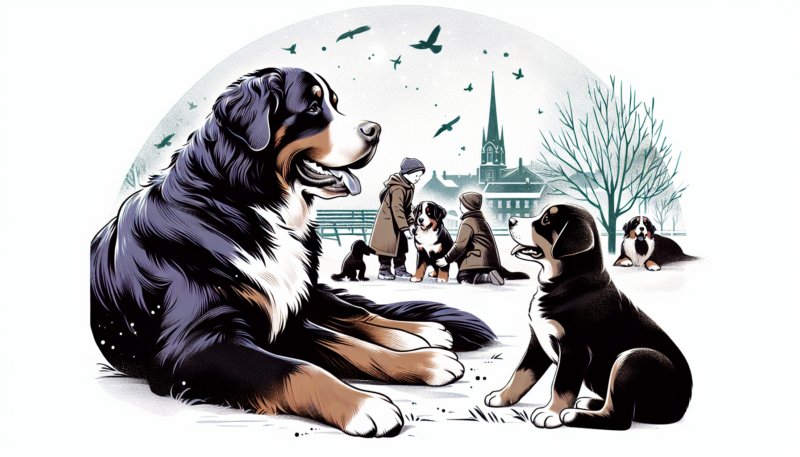If you’ve ever wondered whether Bernese Mountain Dogs are compatible with other canines, you’re in the right place! Known for their gentle disposition and friendly nature, Bernese Mountain Dogs often excel at getting along with other dogs. Their calm and easygoing temperament makes them ideal companions for socialization and playdates. In this article, we will explore the compatibility of Bernese Mountain Dogs with other furry friends, providing you with insights on their demeanor and how to foster positive interactions between them.

Physical Attributes of Bernese Mountain Dogs
Size
Bernese Mountain Dogs are large and sturdy dogs, known for their impressive size. On average, they stand between 23 and 27 inches at the shoulder and weigh anywhere between 70 and 115 pounds. Their substantial size and strength make them excellent working dogs, capable of handling tasks such as drafting and pulling heavy loads. Despite their size, Bernese Mountain Dogs have a gentle and friendly disposition, which makes them well-suited for families and households with other dogs.
Coat and Appearance
One of the most striking features of Bernese Mountain Dogs is their beautiful tri-colored coat. They have a thick double coat, with a long, outer layer of hair and a soft and dense undercoat. The combination of their coat and size gives them a majestic and regal appearance. The standard coloring of a Bernese Mountain Dog includes a black base coat with white markings on the chest, muzzle, and paws, as well as rust-colored patches above the eyes, on the cheeks, and on the legs.
Temperament of Bernese Mountain Dogs
Friendly and Gentle
Bernese Mountain Dogs are known for their friendly and gentle nature. They are typically very good-natured, affectionate, and patient, which makes them wonderful family pets. Their kind demeanor extends not only to humans but also to other dogs. Berners, as they are affectionately called, are often sociable and enjoy the company of other dogs. Their friendly disposition allows for easy integration into households with other canines, as they are usually accepting and tolerant of other dogs’ presence.
Reserved and Protective
While Bernese Mountain Dogs may be friendly and gentle, they also have a natural instinct to protect their loved ones and their territory. They can be reserved around strangers, initially observing and assessing the situation before fully warming up to newcomers. This reserved nature can extend to other dogs as well. Bernese Mountain Dogs may take some time to adjust to new canine companions and establish trust. However, with proper socialization and training, they can overcome this reservation and learn to coexist harmoniously with other dogs.
Socialization Needs
Socialization is of utmost importance for Bernese Mountain Dogs to ensure they grow up to be well-adjusted and friendly canines. Exposing them to various people, animals, and environments from an early age helps them develop confidence and good social skills. Introducing your Bernese Mountain Dog to different dogs, both in controlled settings and supervised playdates, will help them become comfortable and familiar with other canine companions. Providing positive experiences during socialization will greatly contribute to their ability to get along well with other dogs throughout their lives.
Interaction with Other Dogs
Establishing a Hierarchy
When integrating a Bernese Mountain Dog into a household with other dogs, it’s essential to ensure a harmonious hierarchy is established. While Berners are generally good-natured, they may assert their dominance if they feel challenged. Establishing clear leadership and boundaries through consistent training and positive reinforcement will help prevent potential conflicts among dogs. Encouraging polite and respectful interactions between dogs, promoting appropriate play, and rewarding good behavior, will contribute to a healthy and balanced relationship between your Bernese Mountain Dog and other canines.
Breed Compatibility
When considering introducing a Bernese Mountain Dog to other dogs, it’s important to consider breed compatibility. While Berners typically exhibit friendly and tolerant behavior towards other dogs, some breeds may not respond well to their large size or exuberant personality. It’s crucial to research the compatibility of different breeds and consider their temperaments, energy levels, and play styles. Consulting with a knowledgeable breeder, veterinarian, or dog trainer can provide valuable insights to determine whether a Bernese Mountain Dog would be a suitable companion for your existing dog or if a different breed may be a better fit.
Introducing Bernese Mountain Dogs to Other Dogs
Introducing a Bernese Mountain Dog to other dogs should be done gradually and in a controlled environment. Start by allowing the dogs to meet in a neutral space, such as a park or yard, where they can interact without feeling territorial. Keep the initial interactions short and positive, allowing the dogs to sniff and observe each other while rewarding calm behavior. Gradually increase the duration and frequency of the interactions, always closely supervising to intervene if necessary. Providing each dog with their own designated space and individual attention will help prevent potential conflicts and ensure a smooth transition as they get to know one another.
Training and Socialization
Importance of Training
Training is essential for all dogs, including Bernese Mountain Dogs. It not only helps them learn basic obedience commands but also establishes boundaries, enhances communication, and builds a strong bond between you and your dog. Training your Bernese Mountain Dog to have good manners and respond reliably to commands can prevent problem behaviors and ensure their interactions with other dogs are positive. Consistency, positive reinforcement, and patience are key components of effective training, and enrolling in obedience classes or working with a professional dog trainer can greatly contribute to their success.
Socialization Techniques
Socialization goes hand in hand with training and plays a crucial role in shaping a Bernese Mountain Dog’s behavior and temperament. Expose your dog to a variety of people, environments, and situations to familiarize them with the world around them. Take them on walks in different neighborhoods, introduce them to various sounds and sights, and organize playdates with other dogs. Gradually increase the complexity of these experiences as your Bernese Mountain Dog grows, always ensuring that each encounter is positive and rewarding for them. A well-socialized Bernese Mountain Dog will feel more comfortable and confident when interacting with other dogs and will be less likely to exhibit fear or aggression.
Professional Guidance
While training and socialization can be done by dedicated owners, seeking professional guidance can be beneficial, especially for first-time Bernese Mountain Dog owners. Professional dog trainers have expertise in handling and training large breeds, and they can offer valuable insights tailored to your specific situation. They can provide guidance on obedience training, socialization techniques, and behavior modification, ensuring that your Bernese Mountain Dog becomes a well-rounded and well-behaved member of your family and can comfortably interact with other dogs.

Factors Affecting Compatibility
Individual Personality
Just like humans, dogs have individual personalities that influence their compatibility with other dogs. While Bernese Mountain Dogs generally have a friendly and gentle temperament, each dog is unique. Some Berners may be more outgoing and sociable, while others may be more reserved or cautious around other canines. When considering introducing a Bernese Mountain Dog to other dogs, take their individual personality into account and ensure that their energy level, play style, and overall disposition align well with potential canine companions.
Sexual Maturity
Sexual maturity can also affect compatibility between Bernese Mountain Dogs and other dogs. As they reach adolescence and adulthood, hormonal changes may impact their behavior and interactions with other dogs, particularly dogs of the same sex. It’s important to monitor their behavior closely during this stage and provide them with appropriate outlets for their energy and socialization needs. Neutering or spaying your Bernese Mountain Dog can also help mitigate any potential behavioral issues related to sexual maturity and improve their overall compatibility with other dogs.
Health and Physical Condition
A Bernese Mountain Dog’s health and physical condition can significantly impact their compatibility with other dogs. Dogs that are in pain or discomfort from underlying health issues may be more reactive or irritable when interacting with other canines. Regular veterinary check-ups, proper nutrition, and exercise are crucial to ensuring your Bernese Mountain Dog is in optimal health and physical condition. By addressing any health concerns promptly and providing appropriate care, you can help promote harmonious interactions with other dogs.
Environment
The environment in which a Bernese Mountain Dog lives can also influence their compatibility with other dogs. Providing a stable and supportive environment that meets their physical, mental, and emotional needs is essential. Sufficient exercise, mental stimulation, and socialization opportunities will contribute to a well-balanced and happy Bernese Mountain Dog. Additionally, ensuring that dogs have their own personal space and access to resources such as food, water, and toys can help prevent potential conflicts and promote a peaceful coexistence with other dogs in the household.
Preventing Aggressive Behavior
Early Socialization
Early socialization is vital in preventing aggressive behavior in Bernese Mountain Dogs. Exposing them to a variety of people, animals, and environments during their critical development period from about 3 to 14 weeks of age can help them form positive associations and develop appropriate social skills. Gradual exposure to different dogs, supervised playdates, and controlled interactions will help them learn how to communicate and play well with others. By setting a solid foundation of positive socialization experiences, you can significantly reduce the likelihood of aggressive behavior later on.
Supervised Playtime
When allowing a Bernese Mountain Dog to interact with other dogs, it’s important to supervise their playtime to ensure safe and positive interactions. Keep an eye on their body language and intervene if any signs of discomfort or aggression arise. Encourage gentle and appropriate play, discourage any rough or overly dominant behavior, and redirect their focus to more suitable activities if necessary. By closely monitoring their playtime and intervening when needed, you can prevent potential conflicts and maintain a safe and enjoyable environment for all dogs involved.
Positive Reinforcement
Using positive reinforcement techniques when training and interacting with your Bernese Mountain Dog is an effective way to prevent aggressive behavior. Rewarding desirable behaviors and ignoring or redirecting unwanted behaviors can help shape their behavior in a positive direction. Provide treats, praise, and affection when they display friendly and calm behavior towards other dogs. This positive reinforcement will reinforce their understanding that good behavior results in rewards, encouraging them to continue exhibiting appropriate social behavior and reducing the likelihood of aggressive tendencies.
Warning Signs and Red Flags
Excessive Dominance
While some level of assertiveness and establishing hierarchy is normal in dog interactions, excessive dominance can be a warning sign of potential aggression. If your Bernese Mountain Dog consistently displays overly dominant behavior, such as excessive mounting, bullying, or refusal to back down from confrontations, it’s important to address these behaviors promptly. Seek guidance from a professional dog trainer or behaviorist to help modify their behavior and establish a more balanced and respectful dynamic with other dogs.
Fearfulness or Aggression
Fearfulness or aggression towards other dogs can be a red flag indicating potential compatibility issues. If your Bernese Mountain Dog consistently shows signs of fear, such as cowering, hiding, growling, or snapping, when in the presence of other dogs, it’s crucial to address these concerns proactively. Fearful behavior can escalate to aggression if not properly addressed. Consult with a professional to develop a behavior modification plan that focuses on building your dog’s confidence and reducing their fear and aggression towards other dogs.
Resource Guarding
Resource guarding is a behavior where a dog becomes possessive and protective of their valued possessions, such as toys, food, or even their humans. If your Bernese Mountain Dog exhibits resource guarding behavior, it can lead to conflicts and potential aggression when other dogs approach these resources. Recognizing the signs of resource guarding, such as growling, snapping, or stiffening when other dogs come near, is crucial. Consult with a professional dog trainer or behaviorist to develop a management and training plan to address this behavior and prevent potential aggressive incidents.
Maintaining a Safe Environment
Proper Supervision
Maintaining a safe environment for both your Bernese Mountain Dog and other dogs requires proper supervision. Always be present and attentive during their interactions, especially in the initial stages of introductions or when unfamiliar dogs are present. Watch for any signs of tension or discomfort and intervene if necessary to prevent potential conflicts. By being proactive and continuously monitoring their interactions, you can ensure a safe and enjoyable environment for all dogs.
Separating Dogs if Necessary
If tensions arise or conflicts occur between your Bernese Mountain Dog and other dogs, it may be necessary to separate them temporarily. Provide each dog with their own designated space where they can feel secure and relaxed. Crate training can be particularly useful in providing a safe retreat for each dog. Separating dogs during mealtime and high-value resource moments can also help prevent resource guarding behavior and potential confrontations. Gradually reintroduce supervised interactions once their emotions have calmed to ensure a positive and conflict-free environment.
Training and Consistency
Consistent training and clear expectations are key to maintaining a safe environment when living with multiple dogs, including Bernese Mountain Dogs. Establishing and enforcing basic obedience commands, ensuring each dog understands their role and boundaries, and consistently addressing any behavioral issues as they arise are essential. Reinforce positive behavior, discourage unwanted behaviors, and provide mental and physical stimulation for each dog. By creating a structured and consistent environment, you can promote peaceful coexistence and minimize potential conflicts between your Bernese Mountain Dog and other dogs.
Taking Precautions with Bernese Mountain Dogs
Public Spaces and Leash Etiquette
When taking your Bernese Mountain Dog out in public spaces, it’s important to follow proper leash etiquette to ensure their safety and the comfort of those around you. Berners are large and powerful dogs, so using a sturdy leash and harness is recommended. Keep your dog on a leash at all times and maintain control to prevent any unwanted interactions with unfamiliar dogs or disturbances to other people. Being considerate of others and respecting leash laws will help create a positive and safe experience for everyone involved.
Dog Parks and Off-Leash Areas
While some Bernese Mountain Dogs may enjoy socializing and playing with other dogs in off-leash areas or dog parks, it’s crucial to assess your dog’s individual temperament and compatibility with different environments. Not all Berners will feel comfortable or thrive in these situations, so it’s important to consider their needs and preferences. If you choose to take your Bernese Mountain Dog to a dog park or off-leash area, closely observe their interactions and be prepared to intervene if necessary. Ensure that the environment is suitable and safe for your Bernese Mountain Dog’s size and sociability.
Encounters with Small Dogs
When interacting with smaller dog breeds, it’s important to be mindful of the size difference between Bernese Mountain Dogs and smaller canines. While Berners are typically gentle and good-natured, their larger size can unintentionally cause harm or intimidation to smaller dogs during play or interactions. Supervise all encounters between your Bernese Mountain Dog and smaller breeds, ensuring that play remains gentle and appropriate. Take extra care to prevent accidental harm, and if necessary, seek out playmates of similar size or engage in controlled activities where size differences aren’t a concern.
Conclusion
Bernese Mountain Dogs are generally well-suited for living with other dogs, thanks to their friendly and gentle nature. However, ensuring a harmonious relationship between your Bernese Mountain Dog and other canines requires proper training, socialization, and ongoing supervision. By following the guidelines for establishing hierarchy, providing socialization and training, and recognizing and addressing warning signs, you can create a safe and happy environment for your Bernese Mountain Dog and your other furry companions. With patience, consistency, and proactive care, you can enjoy a fulfilling and enjoyable multi-dog household with your Bernese Mountain Dog as a cherished member.
